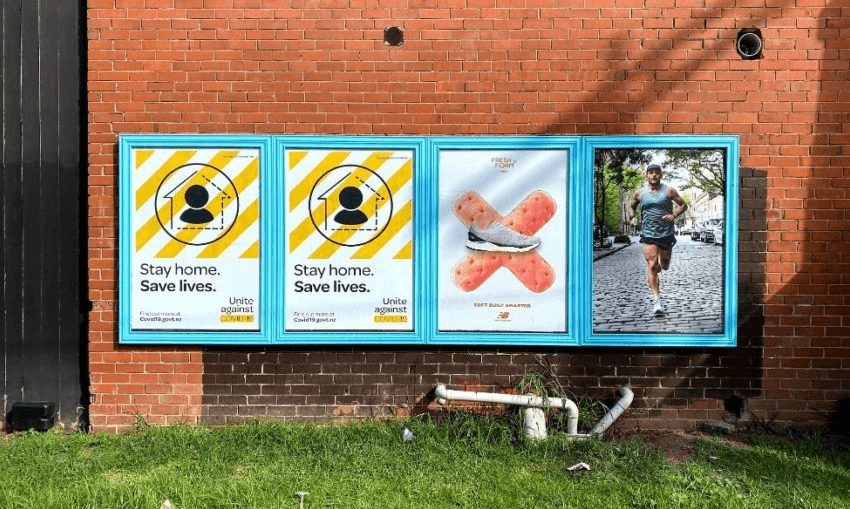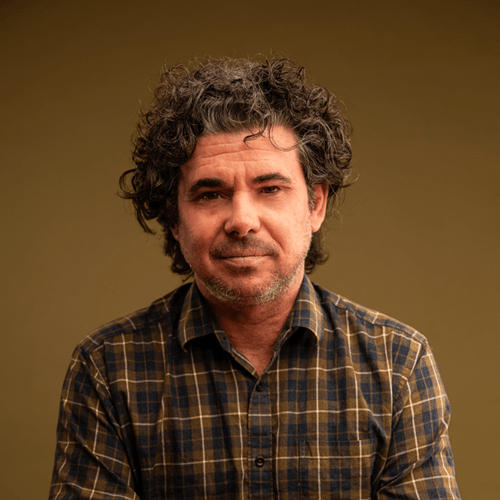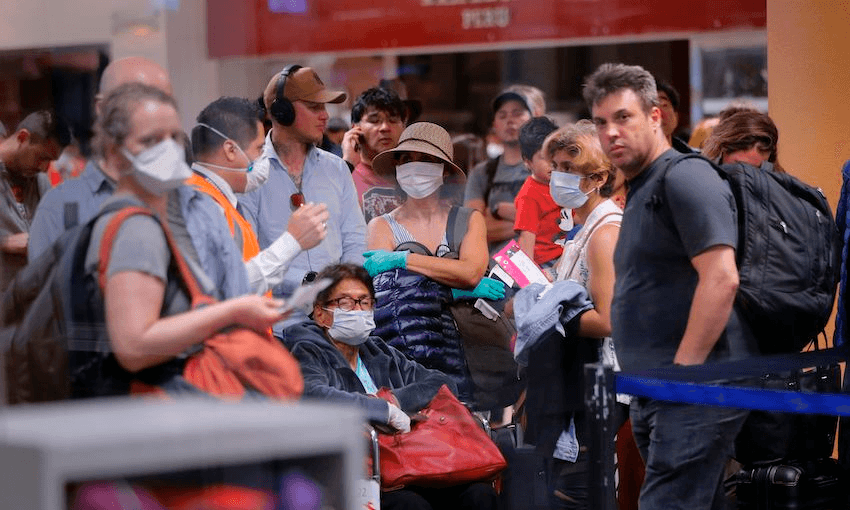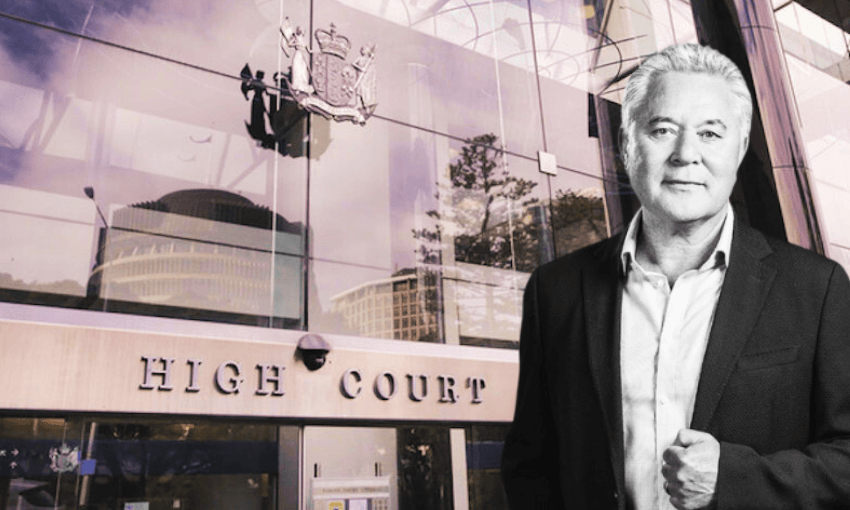For all The Spinoff’s latest coverage of Covid-19 see here. Read Siouxsie Wiles’s work here. New Zealand is currently in alert level four. The country is shut down, apart from essential services. For updated official government advice, see here.
The Spinoff’s coverage of the Covid-19 outbreak is funded by The Spinoff Members. To support this work, join The Spinoff Members here.
9.00pm: Foodstuffs pledge 10% bonus to staff working amid lockdown
One of New Zealand’s two big supermarket groups, Foodstuffs, says it will provide a 10% bonus to staff “as a gesture of appreciation to essential staff” at its retailers, which include New World, Pak’n Save and Four Square, reports 1 News.
It added: “All vulnerable employees who are unable to work will still be paid whilst they self isolate from home,” the company said.
The pledge follows reports that New World supermarket had told workers they face leave without pay if they are unable to work over the lockdown.
Asked about these reports earlier today, the prime minister, Jacinda Ardern, said she would be speaking more about the issue tomorrow. “I see supermarkets as being in quite a particular position at the moment, not least for the fact that they have not experienced a downturn through Covid-19, so that’s why I want to come back with some quite specific advice,” she said.
6.15pm: The sources of imported cases
The majority of cases of confirmed or probable Covid-19 relate to people who have recently returned from overseas. It seems a long time since the Ministry of Health briefings involved detailing the precise flights and seat numbers of those in that unfortunate position – it would take hours to do so now – but they are still providing information, including flight numbers and dates, online.
Where are most of the cases coming from? Based on the latest data, here are the top countries people who have or have had Covid-19 in New Zealand returned from.
United States: 71
United Kingdom: 43
Australia: 41
United Arab Emirates: 27
Singapore: 13
Qatar: 11
France: 6
Indonesia: 6
Switzerland: 6
Argentina: 4
Canada: 4
Egypt: 3
Germany: 3
Ireland: 3
Spain: 3
5.30pm: Where are the clusters?
There are seven “significant clusters” in New Zealand, as classified by the Ministry of Health. As of this afternoon those are:
Marist College, Auckland: 31 confirmed cases, 5 probable
World Hereford Conference, Queenstown: 17 confirmed cases, 2 probable
Private wedding, Wellington: 10 confirmed cases, 2 probable
Group travel to US, Wellington: 15 confirmed cases, 2 probable
Assisi Rest home, Hamilton: 11 confirmed cases
Matamata: 9 confirmed cases
A workplace, Christchurch: 8 confirmed cases, 1 probable
Stuff is reporting that the Waikato DHB has confirmed that Matamata cluster to now be 15, and that one social event linked most of the cases.
4.30pm: Air NZ passenger numbers plummet
An average day on Air New Zealand would see about 48,000 passengers travelling across the domestic network. Or so it used to be. Yesterday, the total passenger number was 671, presumably almost all essential workers. If I have my maths right, that’s a drop of more than 98.5%. Chief revenue officer Cam Wallace put it like this: “These dire numbers reflect favourably and show that kiwis are respecting the essential travel advice.”
3.45pm: ‘Violence is still a crime’
With domestic violence at greater risk and support services under pressure amid the lockdown, New Zealand’s chief victims adviser, Kim McGregor, has issued a statement appealing to those affected. “My message for all New Zealanders: You are not alone. It’s not OK for anyone to hurt you. Violence is still a crime,” she said. “Government agencies and support organisations remain staffed and are determined to help anyone who is experiencing violence. These are essential services. If you are being harmed, there are a range of social services with national help lines available to talk to you, as well as offer practical support and access to safe, emergency accommodation if you need it.”
A list of helplines is on the Ministry of Justice site.
3.15pm: New tool for reporting bad employers
On top of the Police 105 site, another online tool has been launched, this time by the Council of Trade Unions, and designed for blowing the whistle on employers who are “using the pandemic as an excuse to unlawfully ignore [workers’] rights”.
“We want to ensure that people are able to tell their stories and log what is happening for them,” said the CTU president, Richard Wagstaff. “Due to the number and complexity of problems that a significant number of working people are experiencing, we need to create a register so that these cases can be triaged and addressed. Where we identify there are systematic breaches of employment law will we be raising these with government.”
The site is here.
2.15pm: What does Covid-19 mean for prisons?
This morning on The Hui, Mihingarangi Forbes asked corrections minister Kelvin Davis if he’d consider releasing low-risk inmates to limit the spread of Covid-19 in prisons as some states in the US have done. Currently, there are no confirmed cases of Covid-19 in our prisons.
“Corrections doesn’t make decisions on who gets released from prisons. If it’s in remand it’s the courts that make those decisions and if people are coming to the end of their sentences it’s the parole board that makes those decisions,” said Davis.
“Our job as corrections is to make sure people who are in our care are being looked after the best that we can and that includes making sure we’re reducing the chances of them contracting Covid-19.”
Davis said corrections has put in a place a number of measures to prevent an outbreak, including banning all visitors, keeping elderly inmates separate, and isolating anyone who has to go to prison for 14 days. He also said prisons had systems in place to separate prisoners if an outbreak did occur, which prisons were able to “trial” during the measles outbreak.
“The reality is at this stage we don’t have to release anybody because we have the capacity at the moment, we have a buffer, and the work that we’ve done to make sure we do have the capacity has been very successful … We don’t see the need to change the rules.”
People Against Prisons founder Emilie Rākete, however, warned later in the programme that a potential outbreak in prisons would be deadly. She said with more than a third of prisoners currently sleeping in double-bunks, physical distancing would simply be impossible.
“Prisoners are twice as likely to be asthmatic, three times likely to be smokers, and more than three times likely to have chronic heart conditions. All of these kill people with Covid-19 … What we’re dealing with here [is really serious] and that isn’t reflected in corrections’ plans to respond.”
1.45pm: New online Police reporting form
Police have issued a release detailing the new online mechanism to report lockdown outlaws. “We know that people want to do the right thing if they see people flouting the restrictions, but we want to ease the load on the non-emergency phone number,” he said. “Police will take the information reported online and make contact to remind those breaching the restrictions of their responsibilities. We are continuing to take the approach of educating and informing people of their responsibilities in the first instance, but we will not hesitate to take enforcement action if people continue to ignore the restrictions.”
At best, this new online system is a necessary channel to maintain order, at worst it’s a pernicious nark line. Please don’t be a dick.
1.30pm: First Covid-19 death in New Zealand; Ardern & Bloomfield briefing
A very sad moment as Covid-19 brings its first death in New Zealand. A woman in her 70s on the West Coast has died. She had initially been admitted for “what were thought to be influenza symptoms, complicated by an underlying chronic health condition”, said Ashley Bloomfield, director-general of health.
There was a period when health staff were using protective equipment suitable for influenza rather than Covid-19. Specifically, they did not have masks. As a precautionary approach, 21 staff are now in isolation.
“We have sufficient hospital capacity to manage our current and projected cases, and we have plans well in place to boost capacity if needed,” said Bloomfield.
There are 63 new cases of Covid-19 overnight, made up of 60 confirmed and three probable cases, bringing the total to 514. Fifty-six people have recovered.
Currently nine people are in hospital with confirmed Covid-19. Three are in Wellington Regional Hospital, and one each in Blenheim, Nelson, Whangarei, Waikato, Taranaki and Dunedin.
One of those is in ICU on a ventilator. The Spinoff understands this is in Wellington hospital.
An average of 1,786 tests a day have been processed over the last week.
Bloomfield said a strong link to overseas travel remained, while a series of clusters were being investigated.
The prime minister is appearing alongside Bloomfield at this briefing, in lieu of her planned 3pm press conference.
Jacinda Ardern began by asking media to respect the privacy of the family of the woman who has died. “It is a very sad day. It also brings home exactly why we are taking such strong measures to stop the spread of this virus. Left unchecked, it runs the risk of taking the lives of many more people,” she said.
“Even with the measures we now have in place, we will continue to see more people get sick because of the time it takes for people to become unwell after they have picked up the virus.”
She added: “Today’s death is a reminder of the fight we have on our hands. And it’s a reminder of why it’s so important.”
It was critical for the lives of older and vulnerable New Zealanders to remain at home, she said. “I have seen reports of New Zealanders not following the rules of the lockdown. In this group, we can all feel rightly frustrated.”
She also urged people to behave respectfully towards those “who are or have battled this illness”. She had seen examples online of bullying of people with Covid-19. “They deserve our support, just as we would for anyone who is sick or in need”.
The prime minister has announced a new online form for reporting of those flouting the lockdown restrictions. She asked the public to use the form at 105.police.govt.nz to report breaches, rather than calling the police, as the phonecalls are causing undue strain on police resources.
On border measures, Ardern said 840 people arrived yesterday, primarily from Australia and the Pacific. Around 300 were expected today.
Asked whether the falling number of confirmed cases was encouraging, Ardern said: “None of us are willing to draw any conclusions at this early stage. We must remember that there is a considerable lag time in any results.”
Bloomfield said he believed Māori account for about 4% and Pasifika 2.3%, “off the top of his head”. Details will be on the Ministry of Health website soon.
Asked how the deceased contracted Covid-19, Bloomfield said there was an overseas link, “but it’s not clear whether that is the mechanism here”.
Asked about what to do with deliveries of shopping, Bloomfield said precautions were being taken by supermarkets and delivery services. “I don’t think people need to do anything else in particular. If they wanted to they could wipe things down with a cloth and a mild disinfectant … The best way to avoid object-to-person tranmission is of course to wash your hands straight afterwards and/or use a hand sanitiser.”
Bloomfield addressed the concerns of fathers who have not been allowed to stay with their partners who had just given birth, saying it was a difficult balance for hospitals to manage the risk of Covid-19 outbreaks in their facilities. “The last place we want it is in our healthcare institutions.”
Asked about the case of the New Zealanders stranded at an airport in Peru, Ardern said MFAT was working directly with such groups. “I know they’re working actively with those who are in Peru currently.”
On the question of community newspapers, Ardern said, “We consider the provision of information to the public as being an essential service. What we’re concerned about there is distribution networks.” She said Kris Faafoi, the minister responsible for media, is in contact with community newspapers to check whether they can use existing distribution networks. “Again, we apply the same principle that we always have. We need to protect the safety of the workforce, and the old forms of distribution just would not work.”
Ardern said they would look at changes to Easter trading rules.
She said that modelling used to inform decision making would be released in the next 48 hours, but that it was unlikely to come as any surprise, given that “much of the modelling we’ve been using is already in the public domain” (such as this).
She said she was hoping soon to speak to Scott Morrison, the Australian prime minister, about the circumstances of New Zealanders in Australia who found themselves locked out of welfare after having their employment affected by Covid-19 measures.
12.05pm: National Party calls for reversal of community paper ban
The National Party has spoken out against the ban on non-daily publications, first revealed yesterday by The Spinoff. “The decision that only paid daily newspapers can continue to publish during the lockdown is wrong. It means many New Zealanders will now be without the news they have come to depend upon and now need during the lockdown,” said the opposition spokesperson for small business, Todd McClay.
“Many of our most vulnerable citizens rely heavily upon community newspapers for social interaction and access to news. This is particularly true in our smaller communities, rural areas and within New Zealand’s ethnic communities,” he said. “Community newspapers provide an important platform to keep the wider public informed on Covid-19. Many elderly do not have easy access to internet or social media and are often not subscribed to or buy daily papers.”
He added: “While these are unprecedented times, media outlets should not be closed arbitrarily – free speech is a pillar to a functioning democracy.”
11am: Important new data revealed
An exclusive new Spinoff survey can reveal the concentration of teddy bears in windows in the Auckland suburb of Point Chevalier.
Almost 25% of houses in the suburb have teddy bears in their windows as viewed from the footpath.
For the purposes of the survey, all stuffed animals were classified as “teddy bears”. There were a lot of dogs and pukeko but detailed data was not recorded.
The topless man sitting on his porch with a bong was not included in the tally.
Of 247 houses viewed across six streets, there were 201 teddy bears in total, suggesting an impressive 0.81 of a teddy bear per house. However, this figure is distorted by the 67 teddy bears in one window on Wright Road.
The survey was conducted on March 28, and has a margin of error of +/- 5% for poor eyesight.
10.15am: When do we get out of lockdown?
David Clark has appeared on Q+A, and Jack Tame is straight out of the blocks with a question to the health minister many are asking: What are the criteria for lifting the lockdown and reducing the alert level?
Clark: “If we see that curve starting to bend, if we can see that the intervention is making a difference and we are starting to see the numbers are coming under control, we’ll take the advice the experts bring to us.”
He said they weren’t looking at specific numbers, but it “really depends on the rate of increase … and whether we’re seeing New Zealanders observe social distance”. The scale of any community transmission was also crucial, he said.
Should we prepare for a longer lockdown beyond four weeks? If people kept on defying the requirements and, for example, catching up for touch rugby, yup, he said.
If people respect the lockdown, however, modelling “does indicate that we should start to see that curve bend some time after 10 days”.
Also on the programme, Shaun Hendy, who has been part of one of a team running modelling, said to expect information on the efficacy of testing soon. “That’s really going to be our number one thing this week. We’re going to start incorporating that into our modelling. And we should be able to say something about how effective our testing and our contact tracing is some time this week.”
It was all about the “lag”, he explained. “There’s an incubation period that’s quite variable for different people. Remember, the numbers that are released every day, some of those people were infected up to two weeks ago. From a statistical point of view, we have to wait for a certain amount of time before we can understand what the disease is doing in New Zealand.”
Read more on the work Shaun Hendy and his colleagues at Te Pūnaha Matatini are doing here.
10am: Mitigation path ‘appalling’ – Michael Baker
Public health academic Michael Baker has been on RNZ this morning. It’s worth reiterating the basis for the lockdown now in place. In response to a listener suggestion that it would make more sense to keep over-70s and the vulnerable in isolation, while the rest gained immunity, Baker, of the University of Otago, explained that such a “mitigation” strategy, such as originally adopted in the UK, had now “abandoned anywhere it’s been considered”. It meant people of all ages lost their lives. It would be “appalling to go down that path”.
Most countries had “really underestimated this”, Baker said. At first “chasing after the virus”, New Zealand’s decision to jump ahead to an “elimination strategy” via lockdown gave us a fighting chance of restoring some version of normal life faster, he said.
Listen here.
9am: The day ahead
Sunday quiz: who is this?
It is, of course, the inimitable Dr Ashley Bloomfield, director-general of health. He’s expected to return after a day off yesterday, fronting the daily briefing. Unless there’s a change to the recent pattern, that will be at 1pm. At 3pm, the prime minister will appear for her daily media briefing at the Beehive. We’ll be watching both, and update with all the important details quicker than you can say Ashley Bloomfield is founding member of the Wellington Menace mountain biking group.
Rachel Thomas of RNZ has profiled the man at the centre of the public health emergency here.
Meanwhile, here’s what you can read on The Spinoff this morning:
- Dismally, predictably, scammers are exploiting vulnerable people during the Covid crisis. Here’s what to watch out for.
- Chief Spinoff pet correspondent Alex Casey on how to look after your pets during lockdown.
- Danyl Mclauchlan has written a powerful essay on a narrow new life in Covid-19.
- Book shops are closed, but big book energy roars on. Books editor Catherine Woulfe wraps up the happenings.
- And the third instalment of Lockdown Letters just landed. Today it’s Renée, and like Ashleigh Young and Morgan Godfery before her, it’s a bit of a tonic, I think, in the midst of a news blizzard.
What else should we be covering? Ping us a note at info@thespinoff.co.nz.
7.45am: International roundup
Mōrena, welcome to our rolling updates for Sunday March 29 in lockdown New Zealand.
In the US, Donald Trump has said he is considering an “enforceable quarantine” of states including New York and New Jersey, to prevent people from the “hot spot” states travelling to other parts of the country. Asked about the remarks, the governor of New York, Andrew Cuomo, said: “I don’t even know what that means … I don’t know how that could be legally enforceable. I don’t even like the sound of it.”
Russia will close its borders completely as tomorrow. According to the state media outlet RT, the number of cases in Russia now numbers 1,264, with “up to seven” deaths.
The medical director of Britain’s National Health Service has said “we will have done very well” if the number of dead in Britain from Covid-19 is kept under 20,000. More than 1,000 people have now died in the UK.
Elsewhere in Europe, Italy has seen its death toll rise over 10,000. Spain has passed 5,800, France is now more than 2,300. Globally, this is what the daily increase in confirmed cases looks like (and the impact around the world), via the Johns Hopkins dashboard:






